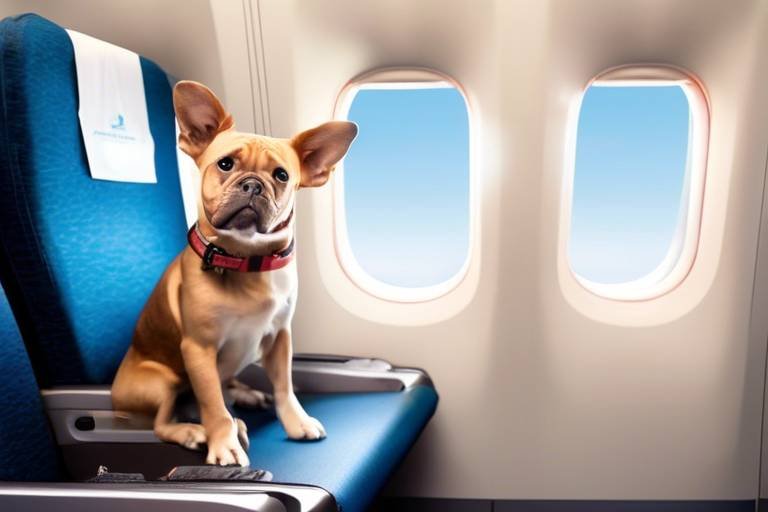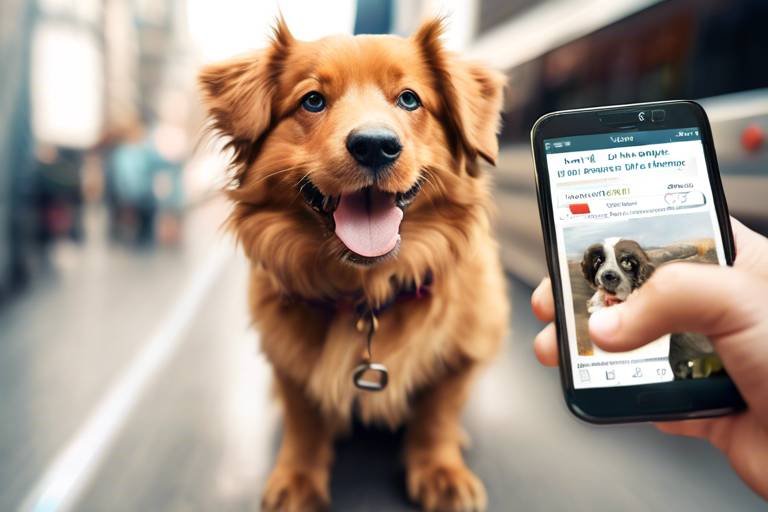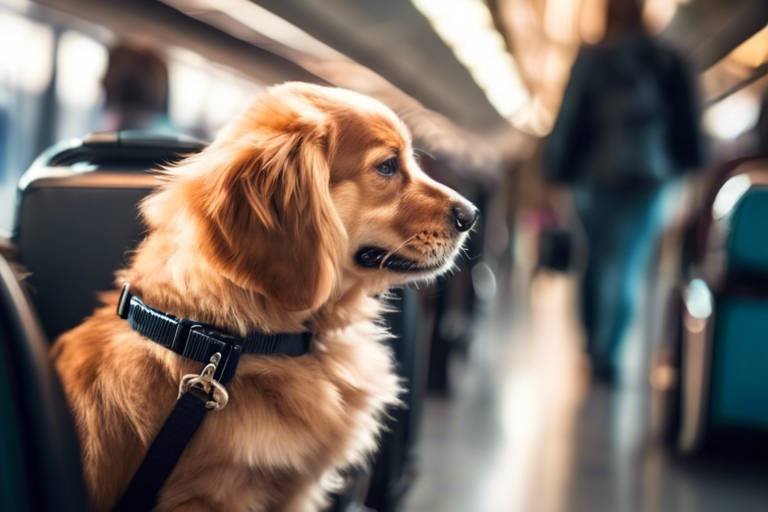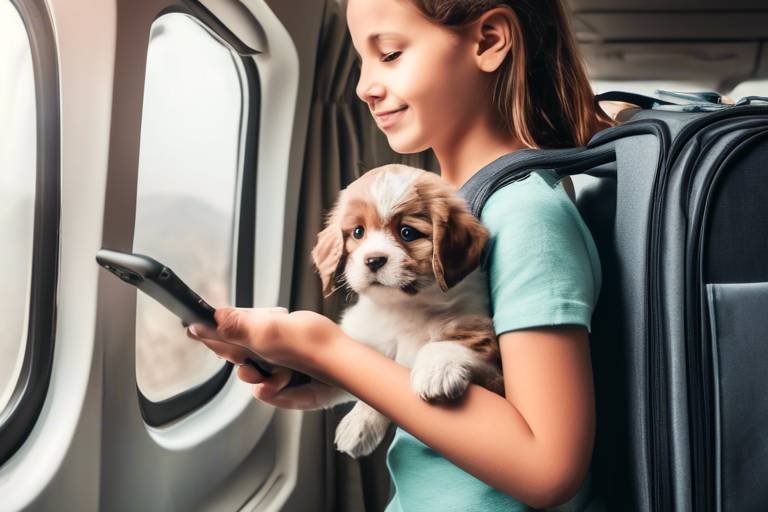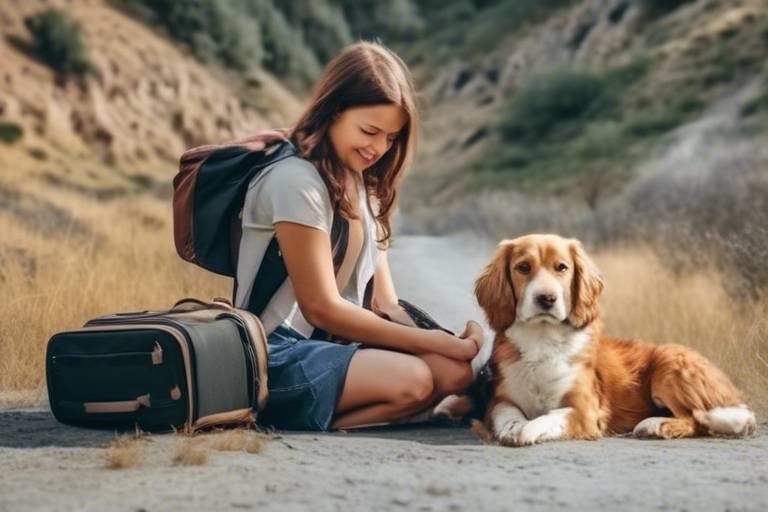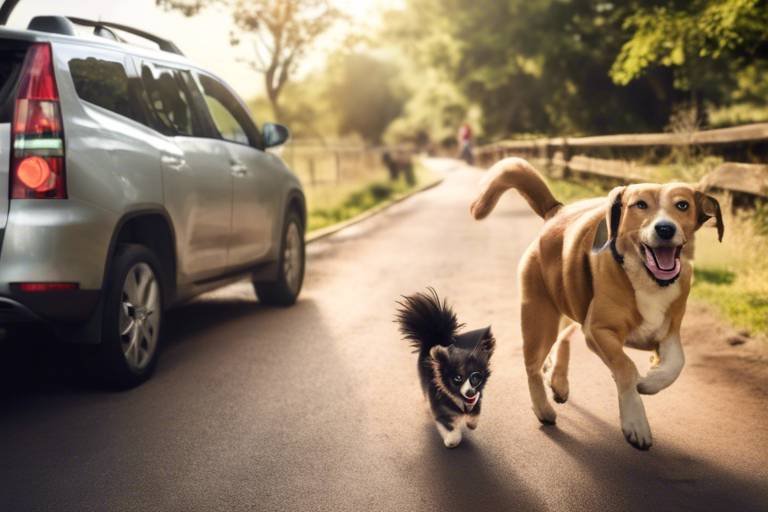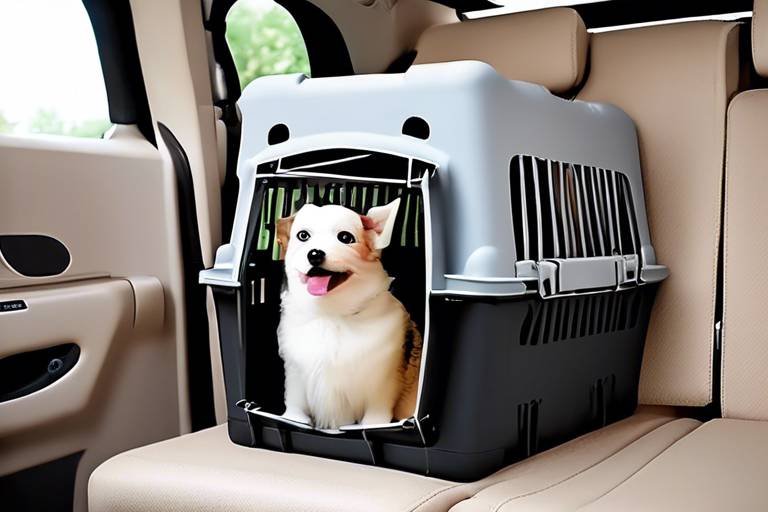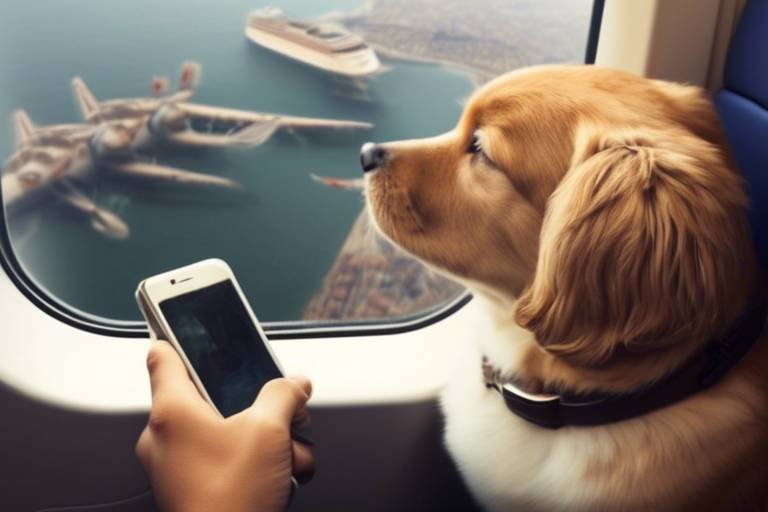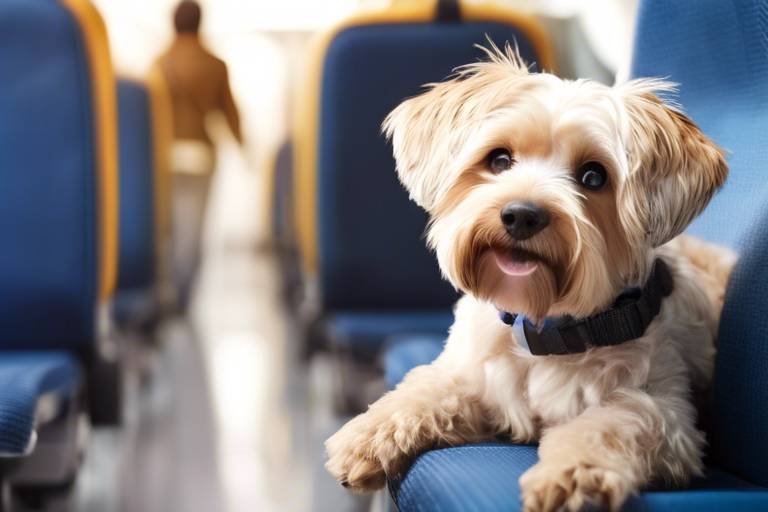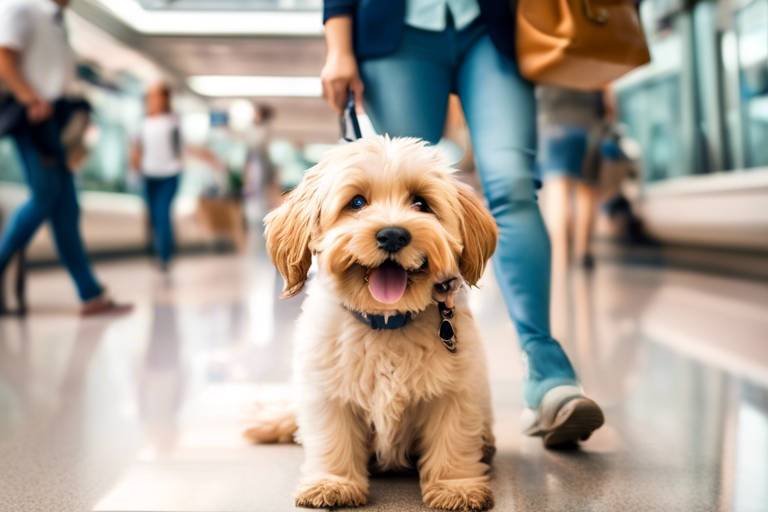Tips for Finding a Pet Travel Buddy
Discovering the perfect travel companion for your furry friend can be a game-changer for both you and your pet. Traveling with a pet is not just about packing their favorite toys or making sure they have enough treats; it’s about ensuring their comfort and safety throughout the journey. A good travel buddy can make the experience smoother and more enjoyable, transforming potential stress into delightful adventures filled with wagging tails and happy purrs. So, how do you find that ideal companion? Let’s dive into some essential tips and insights that will help you choose wisely!
Every pet is unique, with its own set of requirements that can greatly influence how they handle travel. Understanding these needs is crucial for selecting the right travel buddy who can cater to your pet's specific habits, preferences, and comfort levels during travel. For instance, does your pet prefer a quiet environment, or are they the life of the party? Is your pet prone to anxiety in new surroundings? Knowing the answers to these questions will help you find someone who can provide the care and attention your pet deserves.
Selecting the ideal travel companion involves considering several factors such as experience with pets, temperament, and compatibility. This ensures that your pet feels safe and comfortable throughout the journey. You wouldn’t want to embark on a road trip with someone who is allergic to dogs or doesn’t understand cat behavior, right? A good travel buddy should be someone who can not only handle your pet but also enjoy their company.
Compatibility between your pet and the travel buddy is vital. Look for shared interests, energy levels, and social behaviors to create a harmonious travel experience for everyone involved. For example, if your dog loves to run and play fetch, it’s beneficial to find a companion who enjoys outdoor activities too. This way, both your pet and their travel buddy can bond over shared experiences, making the journey more enjoyable.
Understanding personality traits can help you find a companion who complements your pet's character. A calm, patient individual may be ideal for anxious pets, while active pets may thrive with an energetic partner. Imagine your shy cat trying to navigate a bustling travel environment with a hyperactive travel buddy—chaos, right? Instead, seek out someone whose demeanor aligns with your pet's personality for a smoother journey.
Experience with pets is essential. A travel buddy who has traveled with animals before will be better equipped to handle unexpected situations and ensure your pet's well-being. They’ll know how to read your pet's cues and respond appropriately. Whether it’s knowing when to take a break or how to calm a nervous traveler, experience goes a long way in creating a stress-free atmosphere.
Effective communication and trust between you, your pet, and the travel companion are crucial. Establishing clear expectations helps prevent misunderstandings and fosters a positive travel environment. Before setting off, have an open discussion about each person's responsibilities. Will your travel buddy help with feeding, walking, or managing any behavioral quirks? Setting these ground rules can make all the difference in ensuring everyone is on the same page.
Creating a well-structured travel itinerary can enhance the experience for both you and your pet. Consider pet-friendly destinations, accommodations, and activities to ensure a smooth journey. The last thing you want is to arrive at a destination that doesn’t welcome pets or find out that the only activities available are not suitable for your furry friend. Planning ahead can save you from potential headaches and ensure a fun-filled trip!
Researching pet-friendly spots along your travel route is essential. This allows you to plan breaks and activities that accommodate your pet's needs, making the trip enjoyable for everyone. Websites and apps dedicated to pet travel can be incredibly helpful in finding parks, restaurants, and accommodations that welcome pets. Make a list of potential stops and ensure they align with your pet's comfort level.
Preparation for emergencies is vital. Having a plan in place, including vet contacts and pet first-aid kits, ensures that you are ready for any unforeseen circumstances during your travels. Accidents happen, and being prepared can make a stressful situation much more manageable. Consider creating a small travel kit that includes essentials like medications, a water bottle, and a basic first-aid kit. This way, you’ll be equipped to handle minor issues on the road.
- What should I look for in a pet travel buddy? Look for someone who understands your pet's needs, has experience with animals, and shares similar energy levels.
- How can I ensure my pet is comfortable during travel? Plan your itinerary with pet-friendly locations and take regular breaks to allow your pet to stretch and relieve themselves.
- What should I include in a pet travel emergency kit? Include items such as medications, a first-aid kit, water, a leash, and any comfort items your pet may need.

Understanding Your Pet's Needs
Discover essential tips and insights on how to find the perfect travel companion for your pet, ensuring a safe and enjoyable journey for both you and your furry friend.
Every pet has unique requirements that can significantly impact their travel experience. Understanding these needs is crucial for selecting the right travel buddy who can cater to your pet's specific habits, preferences, and comfort levels during travel. For instance, some pets thrive on routine, while others are more adaptable to changes. Recognizing your pet's personality is the first step in ensuring a smooth journey.
When considering your pet's needs, think about their age, size, and health status. Older pets may require more frequent breaks and a comfortable place to rest, while younger, more energetic pets might need opportunities to play and explore. Additionally, pets with health issues may need special accommodations, such as access to medication or specific dietary requirements. A travel buddy who understands these nuances can make a world of difference.
Moreover, it's essential to pay attention to your pet's social needs. Does your furry friend enjoy the company of other animals, or do they prefer solitude? Understanding their social behavior can help you choose a companion who aligns with their comfort level. For example, if your pet is shy or anxious around strangers, a calm and patient travel buddy can provide reassurance.
| Pet Type | Common Needs | Travel Tips |
|---|---|---|
| Dogs | Regular exercise, social interaction | Plan for frequent stops, bring toys |
| Cats | Quiet environment, familiar items | Bring a favorite blanket, avoid loud places |
| Small Pets | Safe transport, minimal stress | Use a secure carrier, limit travel time |
Ultimately, understanding your pet's needs is about creating a travel experience that is enjoyable and stress-free for both of you. By taking the time to assess these requirements, you’ll be better prepared to find a travel buddy who complements your pet's personality and ensures a delightful adventure.
Selecting the ideal travel companion involves considering factors like experience with pets, temperament, and compatibility. This ensures that your pet feels safe and comfortable throughout the journey.
Compatibility between your pet and the travel buddy is vital. Look for shared interests, energy levels, and social behaviors to create a harmonious travel experience for everyone involved.
Understanding personality traits can help you find a companion who complements your pet's character. A calm, patient individual may be ideal for anxious pets, while active pets may thrive with an energetic partner.
Experience with pets is essential. A travel buddy who has traveled with animals before will be better equipped to handle unexpected situations and ensure your pet's well-being.
Effective communication and trust between you, your pet, and the travel companion are crucial. Establishing clear expectations helps prevent misunderstandings and fosters a positive travel environment.
Creating a well-structured travel itinerary can enhance the experience for both you and your pet. Consider pet-friendly destinations, accommodations, and activities to ensure a smooth journey.
Researching pet-friendly spots along your travel route is essential. This allows you to plan breaks and activities that accommodate your pet's needs, making the trip enjoyable for everyone.
Preparation for emergencies is vital. Having a plan in place, including vet contacts and pet first-aid kits, ensures that you are ready for any unforeseen circumstances during your travels.
- What should I consider when choosing a travel buddy for my pet? Look for someone who understands your pet's needs, has experience with animals, and shares compatible energy levels.
- How can I ensure my pet is comfortable during travel? Make sure to bring familiar items, plan for regular breaks, and keep to their routine as much as possible.
- What should I do in case of an emergency while traveling? Always have a pet first-aid kit, know the location of nearby veterinarians, and keep emergency contacts handy.

Choosing the Right Companion
When it comes to traveling with your pet, the choice of a travel companion can make all the difference. It's not just about finding someone to share the journey with; it's about ensuring that both you and your furry friend feel comfortable and safe throughout the trip. The ideal travel buddy should not only be a friend but also someone who understands the nuances of pet care and is willing to adapt to your pet's needs. So, how do you go about selecting this special person? Let's dive into some key considerations.
First and foremost, think about experience. A travel companion who has a background in handling pets will be invaluable. They’ll know the ins and outs of pet behavior, which can be particularly helpful in stressful situations. For instance, if your dog gets anxious during car rides, having someone who understands dog behavior can help soothe them and keep everyone calm. It's like having a seasoned navigator on a road trip; they know the best routes and how to avoid potential bumps along the way.
Next, consider temperament. Your travel buddy's personality should complement your pet's. If you have a high-energy dog who loves to play, an equally energetic companion will keep the fun going. Conversely, if your pet tends to be more reserved or anxious, a calm and patient person might be the perfect match. Think of it as a dance; the rhythm and style of both partners need to align for a beautiful performance. A mismatch can lead to chaos, which is the last thing you want when you're trying to enjoy a getaway.
Another essential factor is compatibility. This goes beyond just personality traits. Are their lifestyles similar? Do they have the same approach to pet care? For example, if you prefer a holistic approach to pet health, it would be beneficial to travel with someone who shares that philosophy. This ensures that you’re on the same page when it comes to feeding, exercise, and even emergency protocols. A travel buddy who matches your pet care values will make the journey smoother and more enjoyable.
Lastly, don’t forget about communication. Establishing clear expectations with your travel companion is crucial. Discuss everything from daily routines to emergency plans before you hit the road. This helps prevent misunderstandings and sets the tone for a positive travel experience. You wouldn’t want to arrive at a pet-friendly hotel only to find out your companion has a different idea of what “pet-friendly” means! So, lay down the groundwork early on, and you’ll avoid any potential hiccups during your adventure.
In summary, choosing the right travel companion for your pet is about finding someone who is experienced, has a compatible temperament, shares your values, and communicates effectively. By taking the time to assess these factors, you can ensure that both you and your furry friend have a safe and enjoyable journey together.
Assessing Compatibility
When it comes to finding the perfect travel buddy for your pet, is key. Just like humans, pets have their own personalities, quirks, and preferences that can make or break a travel experience. Imagine planning a road trip with a friend who loves to take spontaneous detours while you prefer sticking to the itinerary; it could lead to frustration for both of you! The same principle applies to your pet and their travel companion.
To ensure a harmonious journey, you should consider several factors that contribute to compatibility:
- Shared Interests: Does your pet enjoy playing fetch? If so, a travel buddy who also loves outdoor activities can make the trip more enjoyable for both. On the other hand, if your pet prefers lounging around, pairing them with a more laid-back companion can create a stress-free environment.
- Energy Levels: A high-energy dog might not do well with a slow-paced buddy. Pay attention to how your pet interacts with others and choose a companion whose energy levels match.
- Social Behaviors: Some pets are social butterflies, while others are more introverted. Understanding your pet's social behavior will help you select a travel buddy that complements their style, ensuring they both feel comfortable and secure.
Another aspect to consider is the environment in which your pet and their companion will be traveling. For instance, if you’re heading to a bustling city, a calm and adaptable buddy can help your pet navigate the chaos. Conversely, if you’re going to a quiet countryside, an active companion may inspire your pet to explore and enjoy the surroundings.
Additionally, it’s wise to observe how your pet reacts to potential companions during initial introductions. Look for signs of mutual interest or discomfort. A wagging tail and playful behavior are good indicators of a budding friendship, while growling or hiding can signal incompatibility. Remember, a travel buddy should enhance your pet's experience, not detract from it.
In conclusion, assessing compatibility is a thoughtful process that requires careful observation and consideration. By focusing on shared interests, energy levels, and social behaviors, you can create a travel dynamic that allows both your pet and their buddy to thrive, making your journey memorable and enjoyable.
Q: How can I tell if my pet will get along with a potential travel buddy?
A: Start with short introductions in a neutral space. Observe their body language; signs of playfulness and curiosity are good indicators of compatibility.
Q: What should I do if my pet doesn’t get along with their travel buddy?
A: If you notice signs of discomfort or aggression, it’s best to separate them. Consider finding a different companion who better suits your pet’s personality.
Q: Are there specific breeds that are more compatible with my pet?
A: Compatibility often depends more on individual personality than breed. However, some breeds do have traits that might align better with your pet’s energy and temperament.
Evaluating Personality Traits
When it comes to finding the right travel buddy for your pet, evaluating personality traits is absolutely essential. Think of it as a matchmaking process where you want to find someone who complements your pet's unique character. Just like humans, pets have distinct personalities that can significantly influence their behavior during travel. For instance, if you have a high-energy dog that loves to play and explore, pairing them with a calm and laid-back person might not be the best idea. Instead, look for someone who shares that zest for adventure. This synergy can make the journey not only smoother but also more enjoyable for both your pet and their companion.
Consider the following traits when assessing potential travel buddies:
- Patience: A patient person can be a lifesaver, especially if your pet gets anxious or restless during travel. They can help soothe your furry friend and keep the atmosphere calm.
- Energy Level: Matching energy levels is crucial. An active person can keep up with a playful pet, while a more relaxed individual might be better suited for a laid-back companion.
- Empathy: Look for someone who can understand your pet's needs and emotions. This trait is vital for creating a supportive environment during the trip.
Moreover, think about how these traits can manifest in real-life scenarios. For example, a patient travel buddy might take the time to stop for bathroom breaks or stretch their legs, allowing your pet to feel comfortable and relaxed. On the other hand, an energetic companion could engage your pet in fun activities, keeping them entertained and happy throughout the journey.
Ultimately, the goal is to create a harmonious travel experience where both your pet and their companion can thrive. By carefully evaluating personality traits, you're not just ensuring a successful trip; you're also fostering a bond that can enrich the journey for everyone involved. So, take the time to chat with potential companions about their experiences with pets, and gauge their reactions to different scenarios. This will give you a clearer picture of whether they are the perfect fit for your furry travel buddy.
Q: How can I determine if a travel buddy is compatible with my pet?
A: Spend some time together in a neutral environment before the trip. Observe how they interact with your pet and look for signs of comfort and mutual enjoyment.
Q: What should I do if my pet doesn't get along with the travel companion?
A: It's crucial to be flexible. If you notice signs of discomfort, it might be best to reconsider the travel buddy or adjust your plans to ensure your pet's well-being.
Q: Are there specific personality traits that are universally good for all pets?
A: While every pet is unique, traits like patience, empathy, and a love for animals tend to be beneficial in most situations. It's important to tailor your choice to your pet's specific needs.
Checking for Experience
Discover essential tips and insights on how to find the perfect travel companion for your pet, ensuring a safe and enjoyable journey for both you and your furry friend.
Every pet has unique requirements. Understanding these needs is crucial for selecting the right travel buddy who can cater to your pet's specific habits, preferences, and comfort levels during travel.
Selecting the ideal travel companion involves considering factors like experience with pets, temperament, and compatibility. This ensures that your pet feels safe and comfortable throughout the journey.
Compatibility between your pet and the travel buddy is vital. Look for shared interests, energy levels, and social behaviors to create a harmonious travel experience for everyone involved.
Understanding personality traits can help you find a companion who complements your pet's character. A calm, patient individual may be ideal for anxious pets, while active pets may thrive with an energetic partner.
When it comes to traveling with pets, experience can make a world of difference. You wouldn’t want to embark on a journey with someone who’s never set foot in the great outdoors, right? Similarly, your pet deserves a travel buddy who understands the nuances of pet care on the go. Here are some key points to consider:
- Previous Travel Experience: Look for someone who has traveled with pets before. This experience means they know how to handle various situations that may arise, from unexpected detours to sudden weather changes.
- Knowledge of Pet Care: A companion who understands basic pet care is invaluable. They should know how to manage feeding schedules, bathroom breaks, and other essential routines that keep your pet comfortable.
- Problem-Solving Skills: Travel can be unpredictable. An experienced travel buddy will have the ability to think on their feet and adapt to changing circumstances, ensuring your pet remains safe and happy.
Moreover, it’s essential to have a conversation with potential travel companions about their past experiences. Ask them questions like:
- What types of pets have you traveled with? - Can you share a challenging situation you encountered while traveling with a pet, and how did you handle it? - Are you familiar with pet first-aid or emergency procedures?
These inquiries not only gauge their experience but also establish a sense of trust. After all, you’re entrusting your beloved pet to someone else's care. A well-experienced travel buddy can turn a potentially stressful journey into a delightful adventure for both you and your furry friend.
Effective communication and trust between you, your pet, and the travel companion are crucial. Establishing clear expectations helps prevent misunderstandings and fosters a positive travel environment.
Creating a well-structured travel itinerary can enhance the experience for both you and your pet. Consider pet-friendly destinations, accommodations, and activities to ensure a smooth journey.
Researching pet-friendly spots along your travel route is essential. This allows you to plan breaks and activities that accommodate your pet's needs, making the trip enjoyable for everyone.
Preparation for emergencies is vital. Having a plan in place, including vet contacts and pet first-aid kits, ensures that you are ready for any unforeseen circumstances during your travels.
Q: How do I know if my pet is ready for travel?
A: Assess your pet's temperament and health. If they are comfortable with car rides and new environments, they may be ready for travel.
Q: What should I pack for my pet?
A: Bring food, water, bowls, leash, waste bags, toys, and any medications your pet may need.
Q: Can I travel with my pet on public transport?
A: Many public transport systems allow pets, but it's essential to check their specific regulations and requirements.
Communication and Trust
When embarking on a journey with your beloved pet, the importance of effective communication and trust cannot be overstated. Just like any good relationship, your connection with your travel companion must be built on understanding and respect. Imagine you’re planning a road trip; you wouldn’t just hop in the car with a stranger, right? The same principle applies when choosing someone to travel with your furry friend. You want to ensure that both you and your pet feel comfortable and secure throughout the adventure.
Establishing clear expectations before the trip can significantly reduce the chances of misunderstandings. Sit down with your travel buddy and discuss how you envision the journey. Will your pet need frequent breaks? How do you handle feeding times? What about bathroom breaks? These are all crucial details that can make or break your travel experience. Make sure to express any concerns you have regarding your pet’s behavior or needs. This way, your companion will be well-prepared to help you manage any situation that may arise.
Additionally, building trust is essential. You want to be confident that your travel buddy will look out for your pet just as much as you do. This can be evaluated through a few key factors:
| Factor | Importance |
|---|---|
| Experience with Pets | Higher likelihood of understanding pet behavior and needs. |
| Previous Travel Experiences | Ability to handle unexpected situations while traveling. |
| Communication Skills | Ensures clarity in discussing plans and concerns. |
| Shared Values | Similar beliefs about pet care can foster a supportive environment. |
By assessing these factors, you can gauge whether your travel companion will be a reliable partner in ensuring your pet’s safety and happiness. Remember, trust is a two-way street. Just as you need to trust your companion, they need to trust you as well. This mutual understanding will lay the groundwork for a smooth and enjoyable journey.
Finally, don’t underestimate the power of open dialogue. Throughout the trip, keep the lines of communication open. Check in with each other regularly to ensure that both your needs and your pet’s needs are being met. Whether it’s a simple question about the next rest stop or a concern about your pet’s behavior, addressing these issues promptly can prevent small problems from escalating into larger ones.
In conclusion, the journey you take with your pet and your travel companion can be an enriching experience filled with memories that last a lifetime. By fostering communication and trust, you ensure that everyone involved—especially your furry friend—has a safe and enjoyable adventure.
- How do I choose the right travel buddy for my pet? Look for someone who understands your pet's needs and has prior experience with animals.
- What should I discuss with my travel companion before the trip? Talk about your pet's routine, feeding schedules, and any specific concerns you may have.
- How can I ensure my pet feels comfortable during travel? Make sure to take regular breaks, keep their favorite toys nearby, and maintain a consistent routine as much as possible.
- What should I do in case of an emergency during travel? Have a plan that includes vet contacts and a pet first-aid kit to handle any unforeseen situations.

Planning the Travel Itinerary
When it comes to planning a trip with your furry friend, crafting a well-thought-out travel itinerary can make all the difference. Not only does it enhance the overall experience, but it also ensures that both you and your pet are comfortable and happy throughout the journey. Think of your travel itinerary as a roadmap that guides you through a delightful adventure, where every stop is a new opportunity for fun and bonding.
First and foremost, consider pet-friendly destinations. This means not just hotels or accommodations that welcome pets, but also parks, beaches, and restaurants where your four-legged companion can tag along. Imagine strolling along a sandy beach, your dog joyfully chasing waves, or exploring a scenic park with your cat in a carrier—these moments are what make travel special. To help you keep track, you might want to create a table of potential destinations, including their pet policies:
| Destination | Pet Policy | Activities |
|---|---|---|
| Sunny Beach | Pets allowed on leash | Swimming, walking |
| Green Park | Pets allowed off-leash | Hiking, picnicking |
| Cozy Inn | Pet-friendly rooms available | Relaxing, dining |
Next, think about the travel logistics. Depending on your mode of transportation—be it a car, train, or plane—your itinerary should account for regular breaks to allow your pet to stretch, hydrate, and relieve themselves. Long hours on the road can be taxing for pets, so planning these breaks is crucial. When you stop, look for places with grassy areas or designated pet zones. You might even want to jot down a list of rest stops that are pet-friendly:
- Rest Area A - Has a pet park
- Rest Area B - Offers water stations
- Rest Area C - Provides shaded seating
Moreover, don’t forget to include pet-friendly activities in your itinerary. Research local attractions that welcome pets, such as dog parks, pet-friendly beaches, or even pet-friendly tours. This way, your pet can join in on the fun instead of being left behind. Imagine the joy of your dog splashing in the surf or your cat lounging in the sun at a pet-friendly café.
Lastly, it’s essential to prepare for unexpected situations. Emergencies can happen, and having a backup plan is crucial. Consider mapping out the locations of nearby veterinary clinics along your route just in case. You can create a small list to keep handy:
- Vet Clinic 1 - Phone: 123-456-7890
- Vet Clinic 2 - Phone: 987-654-3210
By planning your travel itinerary with these considerations in mind, you’re setting the stage for a memorable adventure with your pet. Think of it as the ultimate treasure map, where every stop is a chance to discover new experiences together. So grab your pen, start jotting down those ideas, and get ready for a journey filled with wagging tails and happy purrs!
Q: How do I find pet-friendly accommodations?
A: Websites like BringFido and Airbnb often list pet-friendly options. Always call ahead to confirm their pet policies.
Q: What should I pack for my pet?
A: Pack essentials like food, water, bowls, leash, waste bags, toys, and any medications your pet may need.
Q: How can I keep my pet calm during travel?
A: Familiarize your pet with the travel environment beforehand, use calming products if necessary, and ensure they have their favorite items with them.
Q: Are there specific travel regulations for pets?
A: Yes, regulations may vary by country or state. Always check the specific requirements for vaccinations and travel documents.
Researching Pet-Friendly Locations
When it comes to planning a trip with your furry friend, is not just a good idea; it's essential! Imagine setting off on a grand adventure, only to find out that your destination doesn’t welcome pets. The disappointment can be overwhelming, not just for you but for your pet too. So, how do you ensure that your journey is filled with joy rather than frustration? Start by diving into some thorough research!
Begin by looking for destinations that specifically cater to pets. Many hotels, parks, and attractions are now rolling out the red carpet for our four-legged companions. Websites like BringFido and PetFriendly provide extensive lists of accommodations and activities that are not only pet-friendly but also perfect for creating unforgettable memories. You can find places that offer pet amenities such as dog beds, treats, and even doggy spas!
While researching, consider the following aspects:
- Accommodation Options: Look for hotels, motels, or vacation rentals that explicitly state their pet policy. Some may have size restrictions or additional fees, so it’s crucial to clarify these details beforehand.
- Nearby Parks and Beaches: Check for local parks or beaches that allow pets. A quick search can reveal hidden gems where your pet can roam freely and enjoy the great outdoors.
- Dining Options: Find restaurants with outdoor seating that welcome pets. Enjoying a meal while your pet lounges by your feet can be a delightful experience!
Another tip is to tap into social media groups or forums dedicated to pet travel. Engaging with fellow pet owners can provide you with real-time recommendations and insights that you might not find in standard travel guides. These communities often share their own experiences, including pet-friendly hotspots and hidden treasures that are perfect for a day out with your pet.
Additionally, don't forget to check local regulations regarding pets. Some areas may have leash laws or restrictions on certain breeds, which could impact your travel plans. Being informed can save you from unexpected headaches during your vacation.
Finally, consider creating a travel itinerary that allows for flexibility. While it's great to have a plan, being open to spontaneous adventures can lead to some of the most memorable experiences. After all, you never know when you might stumble upon a dog-friendly festival or a quaint café that welcomes pets with open arms!
In summary, researching pet-friendly locations is about more than just finding a place to stay; it's about ensuring that both you and your pet have a fantastic time together. With a little planning and creativity, your trip can be an adventure filled with fun and companionship!
Q: How do I find pet-friendly accommodations?
A: Websites like BringFido and PetFriendly are excellent resources for finding pet-friendly hotels, vacation rentals, and attractions.
Q: Are there any restrictions for pets in public spaces?
A: Yes, many parks and beaches have specific rules regarding pets, including leash laws and breed restrictions. Always check local regulations before visiting.
Q: Can I take my pet to restaurants?
A: Many restaurants with outdoor seating areas welcome pets. It's best to check their pet policy in advance to avoid any surprises.
Q: What should I pack for my pet during travel?
A: Essential items include food, water, a leash, waste bags, a first-aid kit, and any comfort items like a favorite blanket or toy.
Preparing for Emergencies
When embarking on a journey with your beloved pet, it's essential to be ready for the unexpected. Emergencies can arise at any moment, whether it’s a sudden illness, an accident, or even a natural disaster. Just like packing your suitcase, you must also prepare a travel bag for your pet that includes all the essentials to tackle any unforeseen circumstances. Imagine being on the road, and your furry friend suddenly becomes ill; having a plan in place can mean the difference between a stressful situation and a manageable one.
First and foremost, ensure that you have a list of local veterinarians along your travel route. This list should include their contact information, operating hours, and distance from your planned stops. You never know when you might need to make a quick detour. Additionally, keep a copy of your pet's medical records, including vaccination history and any ongoing treatments. This information can be crucial if your pet requires medical attention while away from home.
Another vital component of your emergency preparedness is a well-stocked pet first-aid kit. This kit should be tailored specifically for your pet's needs and can include:
- Bandages and gauze
- Antiseptic wipes
- Pet-safe pain relievers
- Hydrogen peroxide (for inducing vomiting, if directed by a vet)
- Any medications your pet may need regularly
It's also wise to include a few comfort items in your emergency kit. A favorite toy or blanket can provide solace to your pet during stressful situations. Remember, pets can sense our anxiety, so having familiar items can help them feel more at ease.
Lastly, don’t forget to prepare for the possibility of needing to evacuate. Familiarize yourself with pet-friendly shelters or hotels along your route. Having a plan for where to go in case of an emergency can save you time and stress. Consider creating a small "emergency plan" document that includes all this information and keep it easily accessible in your travel bag.
In essence, while we hope for smooth travels, being prepared for emergencies ensures that both you and your pet can enjoy the journey without unnecessary worry. After all, the joy of traveling with your furry friend should be about creating wonderful memories, not stressing over what could go wrong!
Q: What should I include in my pet's first-aid kit?
A: Your pet’s first-aid kit should include bandages, antiseptic wipes, pet-safe pain relievers, and any medications your pet may need regularly. Don't forget comfort items like a favorite toy.
Q: How can I find a veterinarian while traveling?
A: Research local veterinarians along your travel route before you leave. Keep their contact information and hours of operation handy in case of emergencies.
Q: What if my pet has a medical emergency while traveling?
A: Stay calm and use your list of local vets to find the nearest one. Having your pet's medical records on hand can help the vet provide the best care.
Frequently Asked Questions
- What should I consider when choosing a travel buddy for my pet?
When selecting a travel companion for your pet, consider their experience with animals, temperament, and how well they mesh with your pet's personality. A good travel buddy should be someone who can handle unexpected situations and make your pet feel comfortable and safe throughout the journey.
- How can I assess compatibility between my pet and the travel companion?
Compatibility can be evaluated by observing shared interests and energy levels. For instance, if your pet is playful and energetic, pairing them with someone who enjoys outdoor activities can create a fun atmosphere. Conversely, if your pet is more laid-back, a calm and patient companion may be a better fit.
- What are the best ways to prepare for emergencies while traveling with my pet?
Preparation is key! Ensure you have a list of emergency contacts, including your pet's veterinarian, and pack a pet first-aid kit. Familiarize yourself with pet-friendly hospitals along your route, and have a plan in place for any unexpected situations that may arise during your travels.
- How can I find pet-friendly locations for our trip?
Research is essential! Use online resources to find pet-friendly accommodations, parks, and attractions along your travel route. Websites and apps dedicated to pet travel can provide valuable information on where to go and what to do with your furry friend, ensuring a fun-filled adventure.
- Is it important to communicate expectations with my travel buddy?
Absolutely! Clear communication is crucial to avoid misunderstandings. Discuss your pet's needs, travel plans, and any specific requirements you have to create a positive and enjoyable environment for everyone involved.




